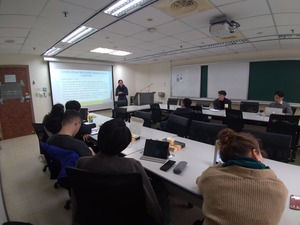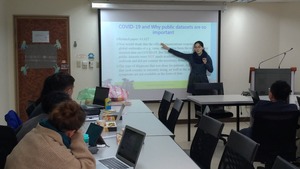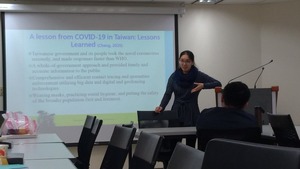Dr. Yu-Hsiu Lin Talks about Big Data amid COVID-19 on IMPIS International Security Seminar



Date :
2020-12-23
Department :
International Master's Program in International Studies
【Article by IMPIS】
The International Mater’s Program in International Studies (IMPIS) on December 18th invited Dr. Yu-Hsiu Lin, the assistant professor of information management from National Chung Cheng University, to deliver a lecture on the topic “Big Data in Health Care: A Lesson from COVID-19 in Taiwan” to the students in the course Seminar on International Security. Through her unique insights into information and big data, the students had experienced an academic adventure closely related to security studies and current events.
Dr. Lin suggested that the bigger the problem, the more urgent for it to be solved by big data. By the combination of public health, technology and big data, as well as the developing research approach of health care in big data (such as administrative efficiency, information transmission, clinical information, clinical decision making, patient behavior model, medical mutual aid information, and etc), the difficulties and obstacles of health care could be rapidly analyzed in full-spectrum and be solved in the future.
By applying health care analysis model in big data, one could be able to track potential patients and have a better control of patients’ frequency of physical exercise, quantity and frequency of smoking, medical record, and etc. Through analyzing the data mentioned above, we could speculate potential diseases for patients and take medical measures in advance. What’s more, the analysis of big data could also bring positive impact to the hospitals’ future operation.
However, the potential risk of personal information leakage has always been one of the biggest challenges for utilizing big data. Patients’ personal information could be leaked through the channel of medical services, and manipulated by insurance companies to track down potential clients. As a result, data secrecy protection remained the most difficult issue to solve in terms of using big data.
One of the students from the United States asked about striking balance between patients’ personal information privacy and the using of data. “Basically, if the hospitals need to collect or use patients’ personal information, they will need their permission and have them sign a letter of consent. Also, the government will be monitoring the data used by all medical research centers, and applies a special mechanism to ensure data secrecy,” Dr. Lin replied.
Dr. Lin then analyzed how Taiwan combat COVID-19 with big data. Taiwanese government did not only maintain a responsive and flexible attitude toward the outbreak, but also provided instant and transparent information to the public to comfort their anxiety caused by the virus. Dr. Lin suggested that NHI MediCloud system also played an important role during the pandemic. The integration between National Health Insurance and NHI MediCloud system allowed the authority to track the information of potential patients, such as their contact, history of illness, and travel history, once they went to any clinics or hospitals to seek for medical services.
Dr. Lin emphasized that the combination of Geographic Information System (GIS) and big data provided us the opportunity to analyze the trend of how COVID-19 spread on a global scale. At the end of the lecture, Dr. Lin guided the students to take a closer look on the COVID-19 Dashboard released by Johns Hopkins University. She encouraged the students to think of how the world have been affected by the pandemic and the possibility of the development of vaccine.
The International Mater’s Program in International Studies (IMPIS) on December 18th invited Dr. Yu-Hsiu Lin, the assistant professor of information management from National Chung Cheng University, to deliver a lecture on the topic “Big Data in Health Care: A Lesson from COVID-19 in Taiwan” to the students in the course Seminar on International Security. Through her unique insights into information and big data, the students had experienced an academic adventure closely related to security studies and current events.
Dr. Lin suggested that the bigger the problem, the more urgent for it to be solved by big data. By the combination of public health, technology and big data, as well as the developing research approach of health care in big data (such as administrative efficiency, information transmission, clinical information, clinical decision making, patient behavior model, medical mutual aid information, and etc), the difficulties and obstacles of health care could be rapidly analyzed in full-spectrum and be solved in the future.
By applying health care analysis model in big data, one could be able to track potential patients and have a better control of patients’ frequency of physical exercise, quantity and frequency of smoking, medical record, and etc. Through analyzing the data mentioned above, we could speculate potential diseases for patients and take medical measures in advance. What’s more, the analysis of big data could also bring positive impact to the hospitals’ future operation.
However, the potential risk of personal information leakage has always been one of the biggest challenges for utilizing big data. Patients’ personal information could be leaked through the channel of medical services, and manipulated by insurance companies to track down potential clients. As a result, data secrecy protection remained the most difficult issue to solve in terms of using big data.
One of the students from the United States asked about striking balance between patients’ personal information privacy and the using of data. “Basically, if the hospitals need to collect or use patients’ personal information, they will need their permission and have them sign a letter of consent. Also, the government will be monitoring the data used by all medical research centers, and applies a special mechanism to ensure data secrecy,” Dr. Lin replied.
Dr. Lin then analyzed how Taiwan combat COVID-19 with big data. Taiwanese government did not only maintain a responsive and flexible attitude toward the outbreak, but also provided instant and transparent information to the public to comfort their anxiety caused by the virus. Dr. Lin suggested that NHI MediCloud system also played an important role during the pandemic. The integration between National Health Insurance and NHI MediCloud system allowed the authority to track the information of potential patients, such as their contact, history of illness, and travel history, once they went to any clinics or hospitals to seek for medical services.
Dr. Lin emphasized that the combination of Geographic Information System (GIS) and big data provided us the opportunity to analyze the trend of how COVID-19 spread on a global scale. At the end of the lecture, Dr. Lin guided the students to take a closer look on the COVID-19 Dashboard released by Johns Hopkins University. She encouraged the students to think of how the world have been affected by the pandemic and the possibility of the development of vaccine.


 Fax:886-2-29379611
Fax:886-2-29379611